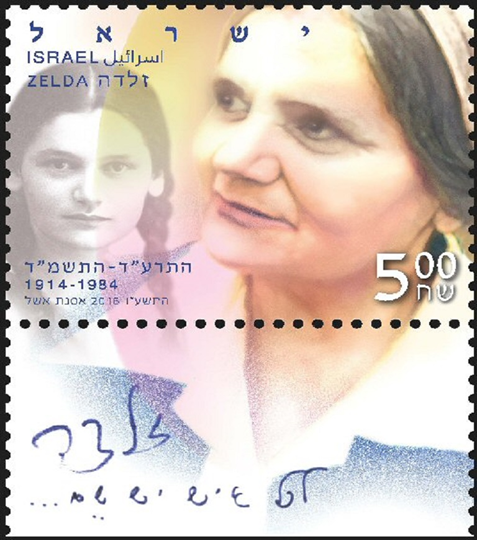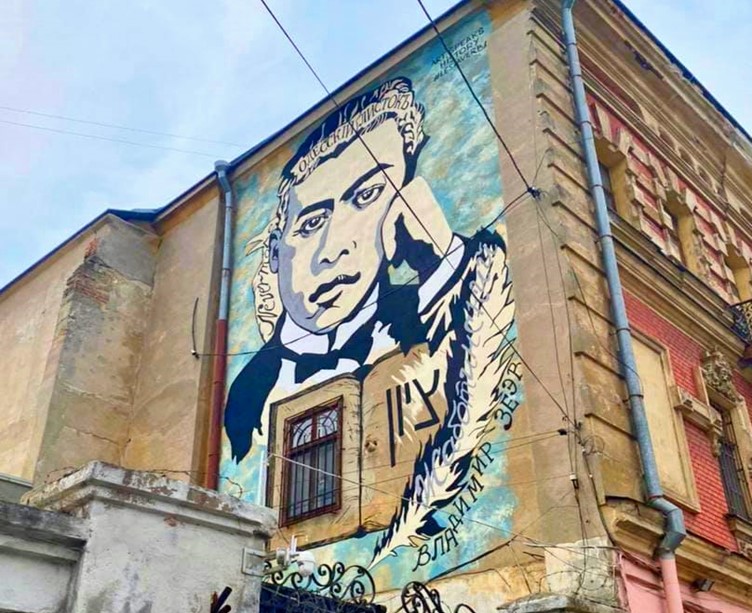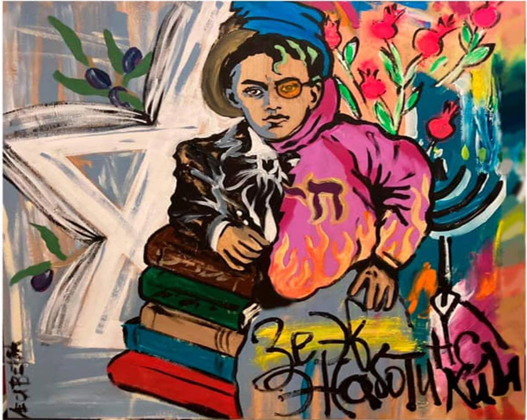Murals honoring distinguished Jews to embellish cities in Ukraine
In April 2021, a huge portrait of the young Vladimir Ze'ev Jabotinsky appeared on the wall of a building located at 31 Bazarna Street, in the center of Odesa. The event was attended by Joel Lion, Ambassador Extraordinary and Plenipotentiary of the State of Israel to Ukraine; Hennadii Trukhanov, mayor of Odesa; and Lesia Verba, the Odesa-based artist and creator of the mural.
The artist gifted the initial sketch to the Israeli ambassador, but the final version of the drawing, according to her, is called White Crow.
“Jabotinsky was a ‘white crow’ [a Ukrainian expression describing someone who does not fit the mold—Trans.] for Odesa and the whole world. He accomplished the impossible, the non-traditional, and the out-of-the-ordinary. Contrary to the rules, the ordinary journalist of the Odesskii listok (Odesa News-Sheet) would become a great person, a symbol of freedom and dignity,” said Verba at the unveiling of the mural.
In an interview with the Ukrainian Jewish Encounter (UJE), the artist explained why the inscriptions are in Russian: "I recreated them in the language in which Jabotinsky’s books and articles of the time were written and signed. Without a political context. For this reason, the name of the newspaper Odesskii listok is also written in a non-state language of Ukraine. In my work, I often use the device when calligraphy and font become part of the image.”
Verba noted that she made three sketches of Jabotinsky at various stages of his life.
The sketch with olive branches best reflects the artist’s perception of Jabotinsky’s image, but the project curators chose the version depicting the young Jabotinsky, from the period when he was being formed as a personality, a creator, and Zionist activist in Odesa.
The building at 33 Bazarna Street, where Jabotinsky was born, has not survived, so the mural was done on the neighboring building.
“The connection between the Zionist movement and Odesa is very deep. Israel and Ukraine have had diplomatic relations for 30 years, but the history of the relationship between Odesa and Jews is colossal. In terms of culture, there is no Odesa without Jews. Jabotinsky is part of the generation of Zionists who became the founding fathers of modern-day Israel,” said Ambassador Joel Lion at the ceremony in Odesa.
The mural was created as part of the project Art Speaks History, which is sponsored by the Israeli Embassy in Ukraine. According to the ambassador, this is an attempt to speak to the younger generation in the language of art. The goal of the project is to install portraits of famous Jewish poets, artists, writers and figures of the Zionist movement in other Ukrainian cities. The Odesa mural is the first stage of the project.
A diplomatic source at the Israeli Embassy in Ukraine informed UJE that such murals are being planned for Dnipro, Kharkiv, and Kyiv. In future, other cities may join this art project.
From this same source, we learned that the city of Dnipro is planning a mural to memorialize the poetess Zelda Schneurson Mishkovsky (1914–1984), a native of this city, who became one of the classics of Hebrew poetry.
 In Israel, Zelda was an unassuming teacher in a religious school. It is interesting that in the early 1950s, one of her pupils, Amos Klausner, was enamored of her. He became the famous Israeli writer Amos Oz, whose mother was born in Rivne.
In Israel, Zelda was an unassuming teacher in a religious school. It is interesting that in the early 1950s, one of her pupils, Amos Klausner, was enamored of her. He became the famous Israeli writer Amos Oz, whose mother was born in Rivne.
Popularity and recognition came late in her life. The poetess won the Bialik Prize and the (Israeli) Prime Minister's Prize for Hebrew Literary Works.
Starting in 1989, the first line of one of Zelda’s most famous poems, “Each of us has a name / given by God / and given by our parents,” became the name of the ceremonies marking Holocaust Martyrs’ and Heroes’ Remembrance Day, during which the president and the prime minister of Israel and the speaker of the Knesset read out the names of Jews who died in the Holocaust.
Zelda’s cousin was Menachem Mendel Schneerson, the seventh Lubavitcher Rebbe, who corresponded with her from New York for many years. Given the influential Jewish community of Dnipro, which is led by Lubavitcher Hasidim, one can safely say that the choice of the poetess will be welcomed in the city.
The candidates for murals in Kharkiv and Kyiv are still being discussed.
Text: Shimon Briman (Israel).
Photos: From the Facebook pages of Lesia Verba and the Israeli Embassy in Ukraine; the website of Israel Post.
Translated from the Ukrainian by Marta D. Olynyk.






















